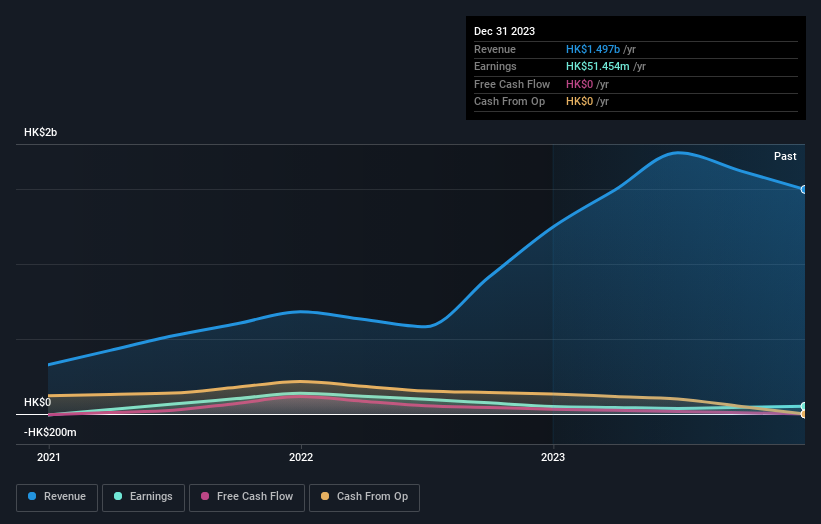- Hong Kong
- /
- Metals and Mining
- /
- SEHK:340
Tongguan Gold Group Limited's (HKG:340) market cap increased by HK$285m, insiders receive a 37% cut

Key Insights
- Significant insider control over Tongguan Gold Group implies vested interests in company growth
- 52% of the business is held by the top 3 shareholders
- Ownership research, combined with past performance data can help provide a good understanding of opportunities in a stock
To get a sense of who is truly in control of Tongguan Gold Group Limited (HKG:340), it is important to understand the ownership structure of the business. We can see that individual insiders own the lion's share in the company with 37% ownership. Put another way, the group faces the maximum upside potential (or downside risk).
As a result, insiders scored the highest last week as the company hit HK$2.2b market cap following a 15% gain in the stock.
Let's delve deeper into each type of owner of Tongguan Gold Group, beginning with the chart below.
View our latest analysis for Tongguan Gold Group

What Does The Lack Of Institutional Ownership Tell Us About Tongguan Gold Group?
Institutional investors often avoid companies that are too small, too illiquid or too risky for their tastes. But it's unusual to see larger companies without any institutional investors.
There are multiple explanations for why institutions don't own a stock. The most common is that the company is too small relative to funds under management, so the institution does not bother to look closely at the company. It is also possible that fund managers don't own the stock because they aren't convinced it will perform well. Tongguan Gold Group might not have the sort of past performance institutions are looking for, or perhaps they simply have not studied the business closely.

Tongguan Gold Group is not owned by hedge funds. Qinlong Jinxin Mining Investment Limited is currently the largest shareholder, with 29% of shares outstanding. With 15% and 8.1% of the shares outstanding respectively, Lin Chang and Yuk Ying Lam are the second and third largest shareholders.
To make our study more interesting, we found that the top 3 shareholders have a majority ownership in the company, meaning that they are powerful enough to influence the decisions of the company.
While it makes sense to study institutional ownership data for a company, it also makes sense to study analyst sentiments to know which way the wind is blowing. Our information suggests that there isn't any analyst coverage of the stock, so it is probably little known.
Insider Ownership Of Tongguan Gold Group
While the precise definition of an insider can be subjective, almost everyone considers board members to be insiders. The company management answer to the board and the latter should represent the interests of shareholders. Notably, sometimes top-level managers are on the board themselves.
Most consider insider ownership a positive because it can indicate the board is well aligned with other shareholders. However, on some occasions too much power is concentrated within this group.
Our information suggests that insiders maintain a significant holding in Tongguan Gold Group Limited. Insiders have a HK$795m stake in this HK$2.2b business. We would say this shows alignment with shareholders, but it is worth noting that the company is still quite small; some insiders may have founded the business. You can click here to see if those insiders have been buying or selling.
General Public Ownership
With a 34% ownership, the general public, mostly comprising of individual investors, have some degree of sway over Tongguan Gold Group. While this size of ownership may not be enough to sway a policy decision in their favour, they can still make a collective impact on company policies.
Private Company Ownership
We can see that Private Companies own 29%, of the shares on issue. It's hard to draw any conclusions from this fact alone, so its worth looking into who owns those private companies. Sometimes insiders or other related parties have an interest in shares in a public company through a separate private company.
Next Steps:
It's always worth thinking about the different groups who own shares in a company. But to understand Tongguan Gold Group better, we need to consider many other factors. Case in point: We've spotted 2 warning signs for Tongguan Gold Group you should be aware of.
Of course this may not be the best stock to buy. Therefore, you may wish to see our free collection of interesting prospects boasting favorable financials.
NB: Figures in this article are calculated using data from the last twelve months, which refer to the 12-month period ending on the last date of the month the financial statement is dated. This may not be consistent with full year annual report figures.
Valuation is complex, but we're here to simplify it.
Discover if Tongguan Gold Group might be undervalued or overvalued with our detailed analysis, featuring fair value estimates, potential risks, dividends, insider trades, and its financial condition.
Access Free AnalysisHave feedback on this article? Concerned about the content? Get in touch with us directly. Alternatively, email editorial-team (at) simplywallst.com.
This article by Simply Wall St is general in nature. We provide commentary based on historical data and analyst forecasts only using an unbiased methodology and our articles are not intended to be financial advice. It does not constitute a recommendation to buy or sell any stock, and does not take account of your objectives, or your financial situation. We aim to bring you long-term focused analysis driven by fundamental data. Note that our analysis may not factor in the latest price-sensitive company announcements or qualitative material. Simply Wall St has no position in any stocks mentioned.
About SEHK:340
Tongguan Gold Group
An investment holding company, engages in the exploration, mining, processing, and sale of gold and related products in the People's Republic of China.
Questionable track record with imperfect balance sheet.

